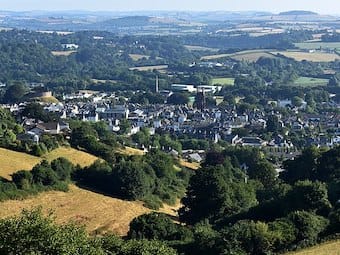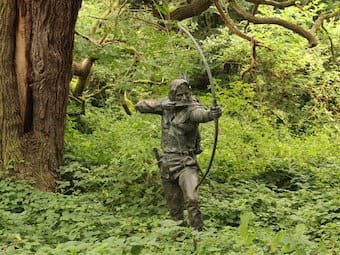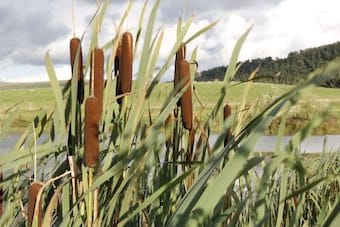The view across Totnes in south Devon, looking towards Dartmoor. Totnes lies on the River Dart, some eight miles upstream from Dartmouth on the English Channel, and according to Geoffrey of Monmouth it was here at Totnes that Brutus and his company made their first settlement on the Island of Albion, after leaving Aquitaine in France. Thus Brutus came to England from France, bringing superior Roman-style military, legislative and cultural sophistication with him, an image Geoffrey hoped the English would bear in mind when they looked back over all that had happened since William of Normandy crossed the Channel and conquered the island in 1066.
SO it was that Brutus and his followers set sail in three hundred and twenty-four ships in quest of a kingdom. The first landfall they made was on an island ravaged by pirates, where there was however a ruined Temple of Diana. Brutus himself led the rites, before lying down to sleep by the altar; and in his sleep he saw a vision of the goddess, who urged to him look beyond the land of the Gauls to an island where he might establish a second Troy.
It was only after many months and many adventures (they were almost wrecked by the Sirens, and were forced into a desperate defence of their camp in Aquitaine) that they stumbled upon the Island of Albion,* and knew it for the land promised by Diana. They landed at Totnes, and at once Brutus divided the island with his trusty friend Corineus, from whom the Cornish take their name. But the island was named Britain after Brutus; and they slew the giants who inhabited it, and took possession of it, founding the city of Trinovantum or New Troy upon the Thames.*
* This becomes of course London, as Geoffrey proceeds to explain at some length.
* The name ‘Albion’ for Great Britain can be traced back to seamen from Massilia (modern Marseilles) in about 525 BC. The Romans called the province Britannia after the name current among the Celts, but kept up the name Albion too and referred it to the White (Latin: alba) Cliffs of Dover. According to Virgil and Livy, the royal house of Brutus’s uncle Sylvius Aeneas was the House of Alba, and Aeneas’s son Ascanius founded the city of Alba Longa near Rome. Alba was also the name of a Scottish kingdom formed by the union of the Picts and Scots under Kenneth I MacAlpin, King of Alba, in 843. After Duncan I united Alba with Strathclyde, Cumbria and Lothian in 1034, the name faded away and in 1094 Duncan II was styled ‘King of Scots’.
Précis
While resting on a deserted island, Brutus saw a vision of the goddess Diana, who told him to seek his kingdom beyond France. There at last they spied the Island of Albion, which they cleared of its native giants and then took for their own. They named it Britain after Brutus, and established New Troy where London now stands. (59 / 60 words)
While resting on a deserted island, Brutus saw a vision of the goddess Diana, who told him to seek his kingdom beyond France. There at last they spied the Island of Albion, which they cleared of its native giants and then took for their own. They named it Britain after Brutus, and established New Troy where London now stands.
Variations: 1.increase the length of this precis to exactly 65 words. 2.reduce the length of this precis to exactly 55 words. 3.introduce one of the following words into the precis: about, besides, despite, may, must, otherwise, until, whether.
About the Authors
Archive
Word Games
Spinners Find in Think and Speak
For each group of words, compose a sentence that uses all three. You can use any form of the word: for example, cat → cats, go → went, or quick → quickly, though neigh → neighbour is stretching it a bit.
This exercise uses words found in the accompanying passage.
1 Almost. Letter. Twenty.
2 Set. Urge. Yet.
3 Generalship. Sleep. Upon.
Variations: 1. include direct and indirect speech 2. include one or more of these words: although, because, despite, either/or, if, unless, until, when, whether, which, who 3. use negatives (not, isn’t, neither/nor, never, nobody etc.)
Statements, Questions and Commands Find in Think and Speak
Use each word below in a sentence. Try to include at least one statement, one question and one command among your sentences. Note that some verbs make awkward or meaningless words of command, e.g. need, happen.
This exercise uses words found in the accompanying passage.
1 Demand. 2 Resolve. 3 Choose. 4 Happen. 5 Gather. 6 Camp. 7 Look. 8 Appeal. 9 Divide.
Variations: 1. use a minimum of seven words for each sentence 2. include negatives, e.g. isn’t, don’t, never 3. use the words ‘must’ to make commands 4. compose a short dialogue containing all three kinds of sentence: one statement, one question and one command
Confusables Find in Think and Speak
In each group below, you will find words that are similar to one another, but not exactly the same. Compose your own sentences to bring out the similarities and differences between them, whether in meaning, grammar or use.
This exercise uses words found in the accompanying passage.
Add Vowels Find in Think and Speak
Make words by adding vowels to each group of consonants below. You may add as many vowels as you like before, between or after the consonants, but you may not add any consonants or change the order of those you have been given. See if you can beat our target of common words.
rd (18+2)
aired. arid. erode. radii. radio. raid. read. red. reed. rid. ride. road. rod. rode. rodeo. rood. rude. rued.
redo. roadie.
Post Box : Ask Nicholas
Grok : Ask Grok
You are welcome to share your creativity with me, or ask for help with any of the exercises on Clay Lane. Write to me at this address:
See more at Post Box.
If you like what I’m doing here on Clay Lane, from time to time you could buy me a coffee.
Buy Me a Coffee is a crowdfunding website, used by over a million people. It is designed to help content creators like me make a living from their work. ‘Buy Me a Coffee’ prides itself on its security, and there is no need to register.
Related Posts
In the days of Henry VIII, eminent Scottish historian John Major looked back to the reign of Richard the Lionheart and sketched the character of legendary outlaw Robin Hood.
Picture: © Richard Croft, Geograph. Licence: CC BY-SA 2.0.. Source.
Posted January 18 2021
Picture: From a thirteenth-century copy of Geoffrey of Monmouth’s Prophetiae Merlini, via Wikimedia Commons. Licence Public domain.. Source.
Posted March 27 2019






